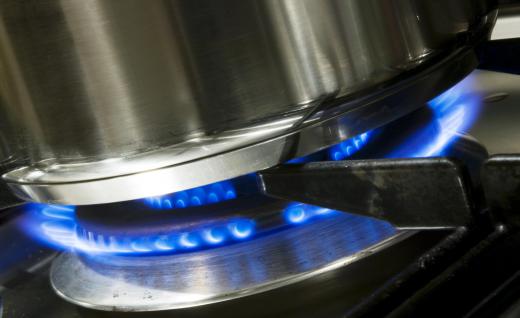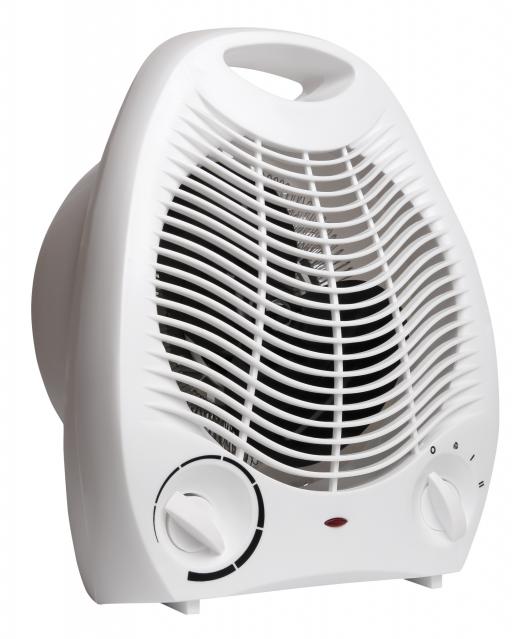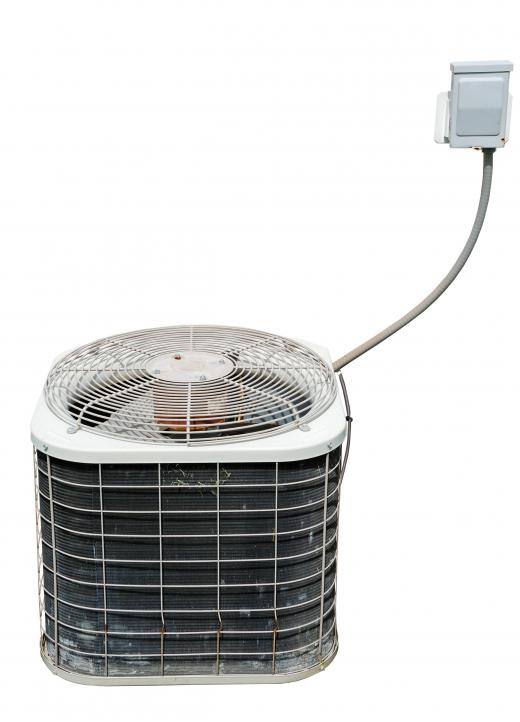What is a BTU?
 Michael Pollick
Michael Pollick
A BTU, short for British thermal unit, is a basic measure of thermal (heat) energy. One BTU is the amount of energy needed to raise the temperature of 1 pound (0.45 kg) of water by 1° Fahrenheit (0.55° Celsius). In other words, if 16 ounces (0.47 l) of water at 59°F (15°C) were poured into a stovetop pan and the gas burner turned on, it would take 1 BTU to raise the temperature of the water to 60°F (15.6°C). If the pan was left on the gas flame, the water would eventually reach the boiling point of 212°F (100°C), which would take about 153 BTUs. This non-metric unit of measure is commonly employed only in certain countries — including the US — and is used mainly to rate the heat output of fuels and appliances.
Definition and Conversions

The precise amount of heat required to achieve a 1°F (0.55°C) increase in temperature varies slightly with the starting temperature of the water. There is no universal agreement on what this should be, so the definition varies with place and context. In the US, a starting temperature of 59°F (15°C) is generally used, but in Canada, it is 60°F (15.6°C). In other cases, it may be an average over a range of temperatures, or it may be equated to a specific value in joules, which are the SI units for energy.

Depending on the definition used, 1 BTU is equal to between 1,054.35 and 1,059.67 joules. Energy, and in particular, heat, is also sometimes measured in calories, with 1 calorie being the amount of heat required to raise the temperature of 0.035 ounces (1 gram) of water by 1.8°F (1°C). One BTU is equivalent to 252 calories. In terms of power, 1 British thermal unit is approximately 0.000293 Kilowatt-hours, or a little under one third of a watt-hour.

A single BTU is quite a small unit of energy. Appliances and devices that have British thermal unit ratings often show values that are in the thousands or tens of thousands. To get an idea of how much energy a single unit represents, it is roughly equivalent to burning one match.
There are other, larger units that are part of the same system. An MBTU is 1,000 British thermal units, but is not often used because the prefix “M,” in SI units, normally represents one million, which causes confusion. An MMBTU is sometimes used to represent one million of these units. A therm is 100,000 BTUs.
Usage
Despite its name, the British thermal unit is rarely used in Britain. It is a pre-metric measurement, and as such is employed mainly in countries where that system has not been fully adopted. In the world of science, the joule is the unit normally used to represent energy, but in some countries, notably the US and Canada, the British thermal unit is the standard measurement of heat output for appliances such as heaters and gas grills, and for fuels such as coal, oil and natural gas. It is also used as a measurement of the cooling effect of refrigerators and air conditioning: these may be given a rating in terms of how many BTUs they can remove from their environment.
The ratings that appear on appliances are actually BTUs per hour, whereas those for fuels are per unit weight, which may be in pounds or tons, or per unit volume, which may be in gallons, cubic feet or barrels. For example, a fan heater may be rated at 34,000 BTU/hr. In the case of fuels, some typical values are 35 million BTUs per ton for coal, 5.6 million per barrel for crude oil, and 1,030 per cubic foot for natural gas.
Calculating Heating and Cooling Requirements
The ability of a source of heat to bring about a given rise in the temperature of a substance depends not only on the energy of the heat source, but also on the specific heat of the substance. Different materials can have very different specific heats; for example, a lot more energy is required to heat water than to heat metals. For a heater, the substance in question is normally air. Specific heats are usually given in metric/SI units, such as kilojoules per kilogram, whereas the rating of a heater may be in BTUs per hour. To calculate the energy requirement to heat a room by a certain amount from this information would therefore require finding the specific heat of air, establishing the volume of the room, calculating the weight of the air, and converting the units as required.
To complicate matters still further, the specific heat value for air is normally that for dry air at normal pressure and for a given starting temperature. The actual value will vary with humidity, pressure, and initial temperature. Fortunately, however, there is no need to go to all this trouble: there are tables and simple online calculators that can be used to work out the approximate heating requirements for a room, based on its dimensions, location, the required temperature increase, and how well insulated it is. For example, heating a typical 1,000 square foot (92.9 square meter), well-insulated home in Boston during the winter might require about 24,000 BTUs per hour.
Calculating Fuel Consumption and Cost
Working out the cost of using a heater is pretty straightforward, if the BTU rating is known. For an electric heater, the rating can simply be converted into kilowatt-hours and the cost per kilowatt-hour obtained from the power company. For an appliance that uses fuel, the rating can be compared with that for the fuel to find out how much it will use over a given period. For example, kerosene has a rating of 135,000 British thermal units per gallon, so a kerosene heater with a rating of 25,000 BTUs will use 1 gallon (3.78 l) of kerosene in 5.4 hours.
AS FEATURED ON:
AS FEATURED ON:













Discussion Comments
@Mrkpop: 25°C is approx 75°F (really 77), 212-75= 137°F; 137°F * 100 pounds equals 13,700 BTU's. You need to add the latent heat, I forget the value but you are said 1000 BTU/pound. So if that is the case, 100 pounds * 1000 BTU/pound = 100,000BTU's
100,000 BTU (latent) + 13,700 BTU (sensible) = 113,700 BTU's to heat 100 pounds of water to saturated steam (this assumes perfect insulation on the heating vessel).
Look at a steam table. The saturated steam is by definition 212°F or 100°C at 1 atmosphere. The values are approximate and depend on elevation.
Which will absorb more BTUs an hour -- hot or colder air, and will the air rise according to its BTU content?
I see a question about BTUs to tempurature (F), but no answer. There doesn't seem to be any clear information on this. Can it be determined how 1000 BTUs will rise the temperature in a 1000 cubic ft area in an hour? I know there are many variable to consider. Just a ballpark formula would be very helpful.
A 40-gallon electric water heater has a 10kw heating element. What will the water temp be after 15 min of heating if the start temp is 50f degrees? Is there an equation?
I have a heat exchanger question. How long will it take the heat exchanger to cool water from 100F to 50F when the BTU/hr of the heat exchanger is 180,984 the volumetric flow rate is 72 gpm?
I have an instrument that the specification said:
Heat dissipation in the environment: about 190 BTU/hour
What does this mean?
There is two air conditioners with BTU value named as 240000 and 600000 what is the most suitable for me. is a current consumption of 600000 btu unit is much higher than the other? The room must be kept in the temperature of 5 degrees celsius.
can you please give me the conversion of btu to degree Celsius. How much of 1 btu is equal to 1 degree Celsius. I am asking this because if 1 degree Celsius increases inside server room then how much additional cooling capacity is needed to cool the room? if some one knows the answer, please tell me.
How much heat (in BTU) would be required to heat and vaporize 100 lb of water from 25°C to saturated steam at 1 atm? Assume heat capacity is constant at 1 BTU/lb-°F and the latent heat of vaporization is 1,000 BTU/lb. Also, what is the temperature of the saturated steam at 1 atm?
How many liters of LPG/butadiene or KwH electricity is required to boil 100 liters water from 27 to 100 degrees celsius? Thank you very much for your kind help. --ernest
I would like to know how to convert 6000 Btu to fahrenheit temperature.
To DotReader re: posting #21. What your reader is asking will best be answered with examples and assumptions (and if you want, a disclaimer).
Could you please provide examples with the following (state any additional assumptions):
1) Three identical rooms, empty, with no heat source, exterior temperature of 110 Fahrenheit, sealed.
2) Three identical window unit air conditioners a) 10,000 BTUs; b) 12,000 BTU; C) 14,000 BTU.
Question:
1) How long will it take to cool a 12ft.x12ft room?
I need to know what is the capacity BTU in terms of tons? For example, a two-ton air-conditioning unit puts out how much BTU? Thanks
If I know how long it takes for an air conditioner to cool a certain volume in a certain time, can i figure out the BTU?
How many BTU will 10 KW produce?
How does the ration vary from BTU (by definition above) from heating water 1 degree to cooling water 1 degree? Case in point, electric bill. I understand it takes significantly more energy ( BTUs) to bring ambient temp in my house from 35 degrees outside to 75 inside {50 degrees}, but what is the difference in BTU usage from cooling the air outside from say, 92 degrees to 75 inside {17 degrees}? Does the measure of BTU's apply to "cooling" as in air conditioners as well?
To: Anon 51366 {Qustion #42}
The amount of thermal {heat} energy to convert a liquid to a gaseous state is largely dependent on the volatility of the liquid in question.
For example, benzene, gasoline, etc. will start to "gas off" or evaporate at room temperature while tap water will take much longer unless thermal energy above ambient {room} temperature is applied. Hope this helps. Mike O From Cincinnati
I have worked out my radiator sizes in Btu's but the seller has them on offer on watts? so how many btu's in a watt?
I'm doing a science fair project and i need to know when btus were discovered, where they were discovered and how did they make this discovery?
Any answers? Please help.
How many BTUs does it take to change liquid to a gas?
It is Fahrenheit instead of Celsius because as what it says there, British Thermal Unit which means it's for Britons. While Celsius is for Americans. Just like how you compute speed. In canada it is Kph while in the US it is by Mph.
The capacity of required hot or cold is the required BTU unit.
why does the definition of a British Thermal Unit refers to Fahrenheit rather than celsius? Anyone have an answer?
How would someone bill using MBTU's? Is there a site that lists the different rates?
to anon38968: Yes, somebody knows how to convert MMBTU to therm. See comment #20 below. Or look up "therm" in a good dictionary.
Does anybody know how to covert MMBTU to therms
To koukla650: Good question. You must distinguish between and. I learned this in 7th grade for a report on steam engines. Energy is a quantity (like stock or inventory), measured in BTU's or Joules. Power is a rate of transfer of energy over time, and is measured in BTU per hour or Joules per second, that is, watts.
Your calorimeter does *not* need to have a time element. You are trying to measure the amount of energy in a quantity of fuel, and it will be the same whether you burn it fast or slow.
I'm a student and for a science project I created my own calorimeter to measure how much fuel and how much time it would take to raise one pound of water one degree F (a.k.a., how much fuel and how much time it would take to produce 1 BTU). What does the time variable mean though? Is it even important? What data can the time give me?
How would I compare the different prices of fuels when propane comes in gallons, natural gas in cubic feet, wood in cords, and electricity in kilowatt hrs? Any help, please?
yeah this is anon23708 again with "btu on plastics
well how would i measure the heat of combustion
how would i burn the plastic?
For "BTU on plastics", a bomb calorimeter is a sealed, insulated box in which you burn a measured amount of fuel and measure the change of temperature that results. I don't recommend making one at home; there's a reason it's called a "bomb", and the work has already been done by others at their own risk.
In order to look up the heat content of plastics, you will need to know the chemical composition. Look at the recycling symbols on the articles in question, and then search for the definitions on a recycling website. You will find abbreviations like "HDPE" for "high-density polyethylene", and then you can research the properties of that plastic.
for anon23708, you can get reference books like Perry & Chilton or Baumeister & Marks at the library - if not your town library, (and ask about interlibrary loan!) then find the library of the nearest college with an engineering program. In most cases, these are open to the public, and well-staffed with helpful people.
Simple rough conversion from BTU Per Hr. to Cubic Ft. Per. Hr.
yeah this is anon23708 again with "btu on plastics" I read on a website that i should use a bomb calorimeter to measure the heat of combustion. what is a bomb calorimeter, how would i use it. Any safety procedures i should follow? Thanks
hi this is anon23708 again. Thanks dotreader for your advice. Well you know I'm fairly new to this kind of topic and well ummm yeah i can't really understand what you wrote, so could you make it simpler. Also where can you get the plastic you were talking about. Where can you get the Marks & Baumeister or Perry & Chilton books. Also is the best way to measure how much energy is released is measuring by btu's. Is there anything. Could you add anything else you might think is helpful. Please Respond. Thanks!
For goldnut2, see my response to muelicious. The heat of combustion of propane is 19,929 Btu/lb (LHV); of natural gas 21,502 Btu/lb (it is mostly methane); of hydrogen 51,571.4 BTU/lb LHV. (Perry & Chilton, Chemical Engineer's handbook, p 3-145; but this information is widely published.)
For muelicious, you will need the temperature and pressure of the methane. Convert from volume to density using the perfect gas law (PV = nRT; look it up in a thermodynamics text so you know what you are doing). Then with density, you have the mass flow rate in lb/hr (be sure to understand mass vs. weight!). The heat of combustion for methane is 21,502 BTU/lb (lower heating value, LHV, that is without condensing the water vapor; see Perry & Chilton p 145) and you have BTU/hr. Then take 30%, for your engine efficiency, and convert to kW using the usual conversion factor.
PLEASE HELP!!!
How do I convert 3.53x10^6 ft^3/day of methane to kW of electricity averaged over 24 hours. This assumes a 30% conversion efficiency to electricity.
Do we need to convert the methane to BTUs per day and then back to kW?
How many BTUs would say 1 cubic Ft. propane or hydrogen or natural gas produces?
For air-conditioners and heaters, remember that BTUs are the unit for energy, but what you are really interested in is the capacity, which is measured in BTUs per hour. The capacity required to heat or cool a room depends on the outside temperature, the inside temperature desired, the surface area of the room, the insulation of the room, energy transfer such as sunlight, and the presence of any internal heat sources such as pizza-ovens. Seek the advice of an HVAC engineer (Heating, Ventilation and Air-conditioning) or study the ASHRAE Handbook (American Society of Heating, Refrigeration and Air-conditioning Engineers)
A "therm" is a unit of energy equal to 100,000 BTU. It is primarily used in billing for natural gas. (Natural gas is about 85% methane, but the exact composition and therefore the exact heat of combustion can vary; billing by "therms" allows the user to be charged for the actual heat content.)
For anon23708, the "BTU's on plastics" you probably want is the "Heat of Combustion". This tells how much energy (BTUs) would be released if one pound of plastic (mostly carbon C and hydrogen H) were burned completely (with oxygen O) to carbon dioxide (CO2) and water vapor (H2O). You can find this information in a handbook of mechanical or chemical engineering (for example Marks & Baumeister or Perry & Chilton)
There is no conversion from BTU to degrees Celsius (C). BTU is a unit for energy, while C is a unit for temperature.
how do you measure BTU's on plastics. See I am doing a science fair project called "How much energy is stored in plastics that we throw away?" I just need to know how to measure BTU's accurately. Please help!
Dear team,
can you please give me the conversion of btu to degree Celsius. How much of 1 btu is equal to 1 degree Celsius.
Speaking of Commercial Pizza Ovens :) We install window film on commercial and residential applications. We recently installed a ceramic based film at a pizza restaurant who gets hammered by the sun on his west facing windows. This is a pretty small restaurant and the oven is essentially right in the middle of it. The film blocks 70% total solar energy and 98% of infrared light. When using a BTU meter on a clear pane, it reads 147, on the filmed window it reads 9. The film is doing it's "job", but he continues to have a good amount of heat in the restaurant. He's convinced that it's still the windows that are letting in the heat in the afternoon and early evening. What is the ratio/size that the chiller would have to be in order to cool over his other objects, i.e. the pizza oven, customers/workers, lighting, etc? Or is it more of a ventilation issue? Any help is much appreciated, thank you.
if I have a air conditioner that is 13,200/12,800 btu's. how many sq ft does that cool?
How can I determine the BTU on candle nuts shell?
How do I measure how many therms I am using?
How do I measure how many BTU's or therms am I using?
What is thermal energy?
how do I measure or test btus? For example, if one unit says 26,000 btus and one unit says 33,000 btus how can I measure each for accuracy?
Where did the BTU get its name from?
BTU are measured by the hour.
Re: dougsherman's post
1 BTU is roughly 1055 joules of heat, or energy. You are mistaking joules with joules/second. Regardless of how long it takes to expose the water to 1 BTU of heat, 1 BTU of heat will raise the temperature of 1 pound of water 1 degree Fahrenheit. (this concept could be related to exposing a pot of water to low heat on a stove or high heat. the higher heat setting will warm the water faster, but the same amount of energy is applied either way to raise the temperature one degree.
OK on your definition, BTU over what time period is the temperature rise of the water measured? If subjected to one BTU of heat for one microsecond, it certainly will not warm the water one Fahrenheit Degree in that same microsecond.
Further how does one measure the BTU capability of a Solar Collector warming air?
Post your comments